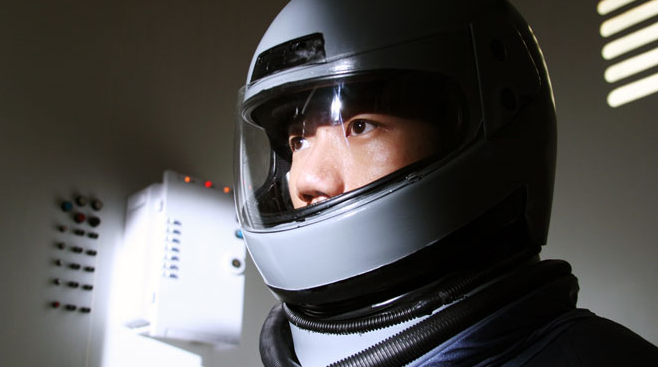
Apitchapong Weerasethakul, Faith, 2006
Film and Electronic Arts Program, Experimental Humanities Program, and Art History and Visual Culture Program Present
“From ‘We Are All Astronauts’ to ‘We Are All Aliens’: Contemporary Art and the Privatization of Space,” a Lecture by Eva Díaz
Monday, April 16, 2018
Ottaway Theater
4:30 pm – 5:30 pm EDT/GMT-4
To Buckminster Fuller the interdependence of human technologies and natural ecologies was exemplified in the notion of "Spaceship Earth,” and his metaphor subsequently became one the most powerful and enduring of the 20th and 21st centuries. It is also one of the most eccentric, conceiving of our planet as a monumental vehicle cum technologically reliant architecture authored by human expertise, useful above all for the purposes of interspace travel. If ever there was a moment to reassess Fuller’s techno-utopian drive to exceed the envelope of Earth, now is that time. In particular, a consideration of what future outer space colonies might be like is taking place in many quarters of contemporary visual art, in large part due to radical human alterations to the Earth’s environment that have come to be called the Anthropocene Era. Artists such as Dawn DeDeaux, MPA, Tomás Saraceno, Tavares Strachen, and Apichatpong Weerasethakul, among others, are producing work, as Fuller did, prototyping new architectures for space travel and exploration, positioning artistic practice as a new kind of public science in which research and experimental procedures are made explicitly visible. Citing Fuller’s work, as well as Sun Ra’s influential space fascination, but diverging from their hopefulness about extraterrestrial colony cities, recent projects by contemporary artists register an elegiac sense that the era of space exploration as a humanistic program of knowledge acquisition, interspecies communication, and even intergalactic colonization—in short, the epoch of cosmic optimism—may have receded if not ended.4:30 pm – 5:30 pm EDT/GMT-4
Eva Díaz is associate professor of the history of art and design at the Pratt Institute in Brooklyn. Her book The Experimenters: Chance and Design at Black Mountain College was released by the University of Chicago Press in 2015. The Experimenters examines how an interdisciplinary group of artists proposed new models of art practice around the concept of experimentation, and focuses on three key Black Mountain teachers in the late 1940s and early 1950s: Josef Albers, John Cage, and R. Buckminster Fuller. Her writing appears in magazines and journals such as the Art Bulletin, Artforum, Art Journal, Art in America, Cabinet, Frieze, Grey Room, Harvard Design Magazine, and October. Díaz was recently awarded a grant from the Graham Foundation to complete her new book After Spaceship Earth, analyzing the influence of R. Buckminster Fuller in contemporary art, a project also supported by a Warhol Foundation / Creative Capital Art Writers Grant.
For more information, call 845-758-6822, or e-mail gcaiazza@bard.edu.
Time: 4:30 pm – 5:30 pm EDT/GMT-4
Location: Ottaway Theater